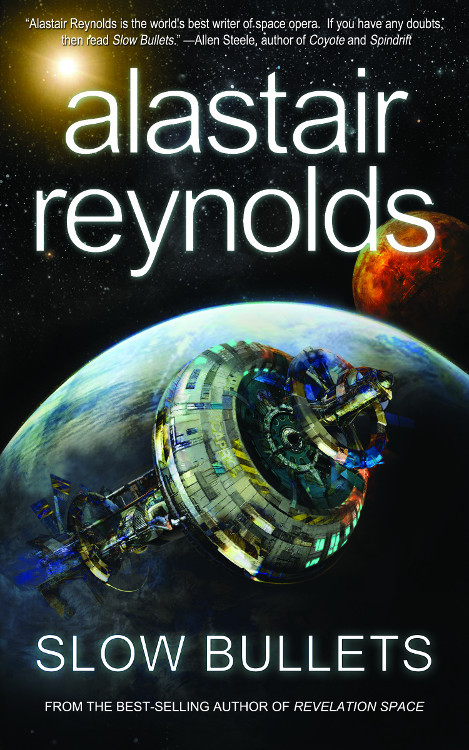Alastair Reynolds’ compelling SLOW BULLETS leaves a big impact
A quartet of new reviews for Alastair Reynolds’ Locus award-winning SLOW BULLETS.

At SF CROWSNEST, Gareth D Jones enjoys the novella.
The story is written in the first person, with Scur as the narrator, and it’s obvious from the start that she is recording the tale for posterity, dropping hints that they will end up being on the ship for quite some time and that there will be no immediate and satisfactory resolution to their inexplicable exile. With a whole group of war criminals and soldiers mixing together, Alastair Reynolds sets things up for a very volatile situation, but Scur’s brevity of style, which is explained later in the story, means that not much time is spent on gratuitous detail. What we have instead is a picture of how these various factions, represented by a small group of main characters, come to terms with their situation and plan for their future.
The internal tensions of the ship are gradually supplemented by the discovery of new information about what has been happening in human space during the time Scur and the others were in hibernation. Some of the overall situation and background were similar to THE IRON TACTICIAN, starting with the derelict ship and continuing with other elements that would spoil the story were I to detail them here. It’s a very well constructed novella, though, building its own texture and history in a different direction to THE IRON TACTICIAN and focusing on the conflicted character of Scur. The slow bullets of the title are a kind of implanted memory chip which initially seem a bit of a gimmick designed for the story, but they come to play a larger role both in the practical way the story plays out and in a symbolic sense. Some would rather their past be forgotten and, for others, it’s all they have. SLOW BULLETS builds nicely to an almost profound conclusion and left a big impact despite its small size.
Mat Coward of MORNING STAR praises the work.
But for the former antagonists who awake from hibernation on a crippled prison ship, impossibly far from home in both space and time, the first task is to avoid reigniting the conflict which would wipe them all out.
The second is to find a purpose, in what seems to have become a purposeless universe.
It’s a compelling adventure story about people trying to make something worthwhile, after lives spent only on destruction.

Photo: Barbera Bella
THE GUARDIAN’s Eric Brown reviews SLOW BULLETS.
Alastair Reynolds’ short novel SLOW BULLETS (Gollancz, £12.99) packs a lot into its 182 pages: far-future warfare, a slowly failing starship and a complex first-person narrator, all wrapped up in a thoughtful, fast-paced plot. Scur is a soldier fighting for the Peripheral Systems in the long war against the Central Worlds. When the war ends, she is captured by an opponent who tortures her and leaves her for dead. Awakening much later, she finds herself aboard the “skipship” Caprice, taking war criminals to the planet of Tottori. But a “skip” that should have taken months has thrust the Caprice hundreds of years into the future, and Scur and her fellow prisoners are stranded on the malfunctioning starship. When she finds that her torturer is also aboard the ship, the scene is set for a rousing drama of revenge – which, in a moving finale, Reynolds subverts with a wonderfully compassionate resolution.
SCIENCE FICTION BOOK REVIEW lauds the book.
Slow Bullets won the 2016 Locus award for best Novella and was shortlisted for the Hugo (along with making a number of must read lists). As you would expect from a novella it’s a short read at 192 pages but it packs in more ideas than many more weighty novels manage.
<snip>
From the Narration itself memory then becomes part of the story when the inhabitants of the Caprice realize that the computer memory is failing and they must try and preserve as much as they can physically by writing on the metal walls and later on their own flesh. I won’t go too much further into the story itself as it’s worth encountering without spoiler but suffice to say it lives up to Reynolds usual epic scale. The book moves from memories of the individual to those of society and race, how it is all but impossible to keep a reliable record of the past and our faith in electronic storage is a short-sighted one.
Not only is this book small, it’s incredibly swift too. I read it in one sitting, one morning. There is no wasted space and most is devoted to moving the plot forward, a departure from much of the author’s works with little time spent world-building or given over to exposition.

For more info about SLOW BULLETS, visit the Tachyon page.
Cover art by Thomas Canty
Design by Elizabeth Story
